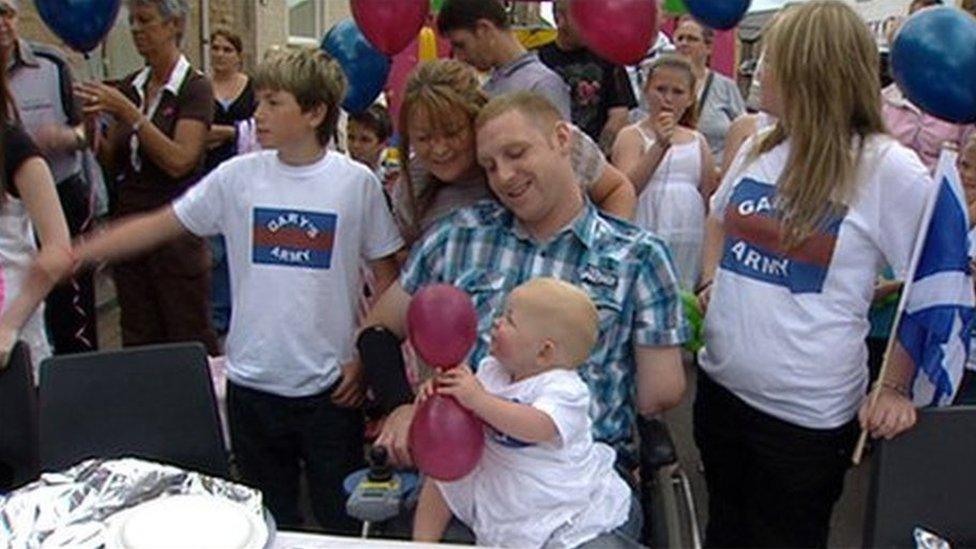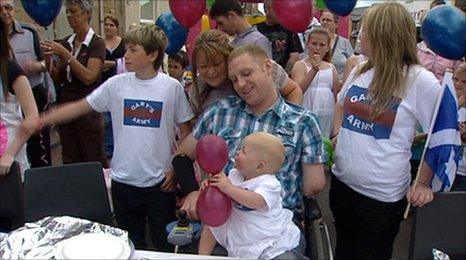Amputee veteran signs up for new factory
- Published
Gary Jamieson lost both legs and an arm in an explosion in Afghanistan in 2010.
Former soldier Gary Jamieson lost both legs and an arm in an explosion in Afghanistan eight years ago but sees no reason why he can't master new skills.
The 38-year-old spent six years in rehab after suffering catastrophic injuries on his second tour of Afghanistan with 1st Battalion, the Scots Guards, in 2010.
He was one of the first to sign up for training at a new factory designed to give veterans a chance to retrain.
The plant in Bishopton in Renfrewshire is the first of its kind in the UK.
Gary was on afternoon patrol when his platoon entered a minefield.

"My foot must have been on the pressure plate of an IED (improvised explosive device)," he told BBC Scotland.
"When I turned, I just detonated it.
"Once the sand came out of my eyes I tried to sit up and realised my legs were away.
"Then my hand fell out of my sleeve, so that was quite a shocking experience."

Sgt Gary Jamieson returned home after weeks of treatment for his injuries
Many months later, he had recovered enough to return home to his family in Stonehouse in Lanarkshire.
The whole village turned out to greet their local hero.
But Gary says his rehab was a long haul because the "stumps" of his limbs were badly damaged.

He now has rods permanently fixed into the stumps.
"Without that I wouldn't be able to walk," he says.
"This is what has gave me new life in the past two years."
He did run his local pub for a while but says it wasn't for him.
Now three times a week, he makes the 90-minute journey to put in a shift at Scotland's Bravest Manufacturing Company in Renfrewshire.

Refurbished and fitted out last year at a cost of £750,000, it offers successful applicants 18 months of training and shop floor experience.
It hopes to train them in a variety of skills and get them into paid employment.
Real world
None of the equipment in the factory is adapted.
It is left to those involved to find ways to work it safely, preparing them for the real world.
The workshop - equipped with a high pressurised water-jet that can cut virtually any material wafer thin - produces road and rail signs, and a range of other products.
Gary says it took him a few days to master the water-jet and start making road signs.
"There was not too much pressure put on us to be exactly perfect straight away," he says.
"Obviously, with me having three amputations, we have to find different ways to do certain things."
But apart from a machine to help him lift the heavy metal sheets, Gary can manage most of the technical skills and is part of a team again.
'Pushing supermarket trollies'
He says he hadn't realised how much he missed the camaraderie of fellow soldiers.
Michelle Ferguson, the director of SBMC, says the company is responding to a need.
In 2015, a study found that ex-service personnel are more than twice as likely to be unemployed as civilians across Scotland.
She says: "It's not about helping veterans get a job pushing supermarket trolleys.
"Success will mean helping those working here make the transition to sustainable employment, on a wage higher than the living wage.
"Everyone on a placement here has a disability - from chronic PTSD to someone like Gary, a triple amputee."
The operation is run by Royal British Legion Industries, with funding from bodies including the Scottish government, Poppy Scotland and the National Lottery.
Gary says he hopes he can be an example to other injured soldiers.
"They will think 'if he can do it, maybe I can do it'," he says.
- Published3 July 2010
